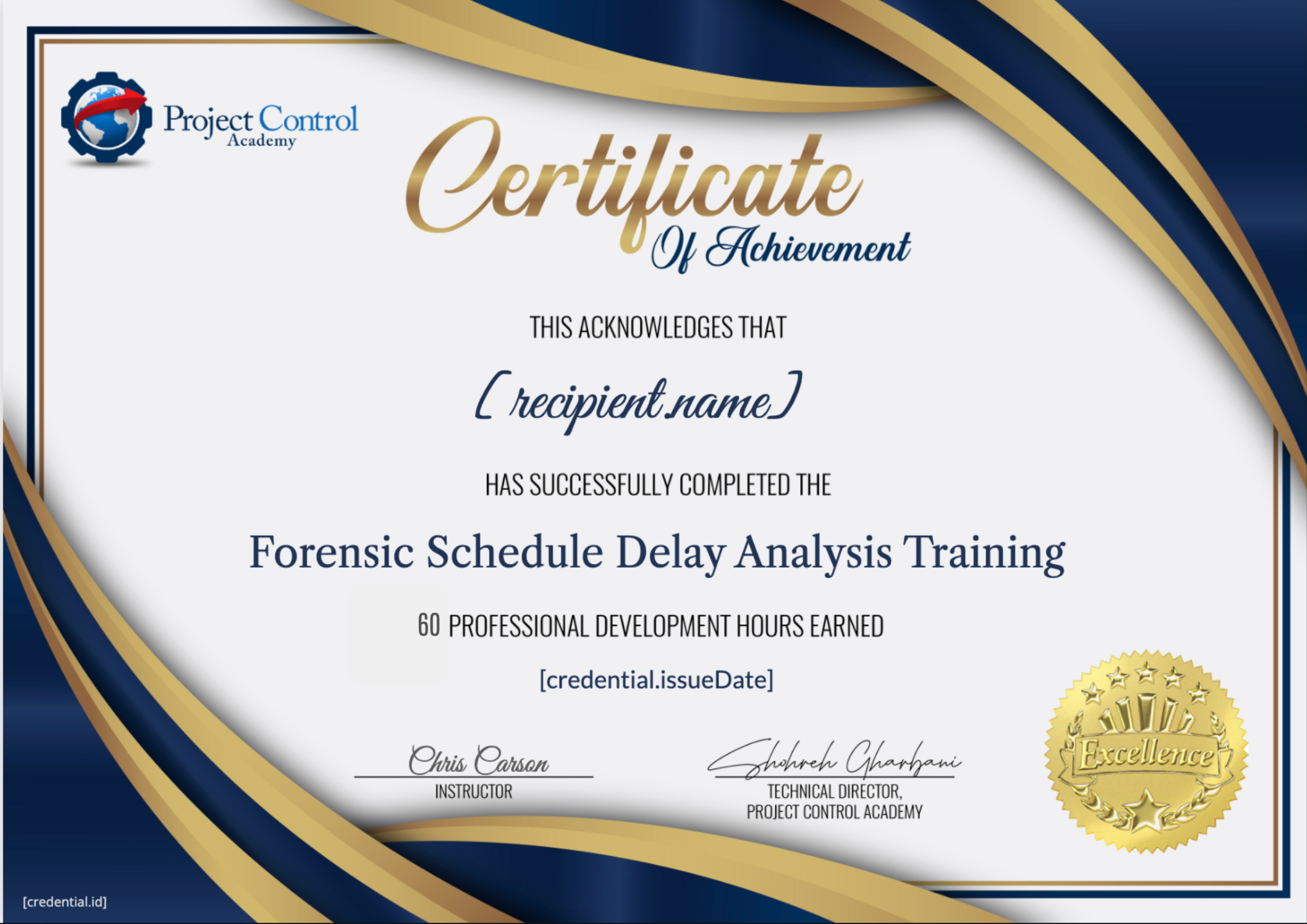Forensic Schedule Delay Analysis
Learn How to Perform Effective Forensic Delay Analysis,
So You Can Proactively Prevent Claims, Resolve Disputes, and
Stand Out as a Forensic Delay Analyst & Expert Witness
(Without feeling overwhelmed, getting lost in analysis methodologies, and spending so much time and money in claim resolution)
This Special Limited-Time Offer Expires in
Have you ever encountered schedule delays that led to claims or disputes in your project?
It’s no surprise if you have! Delays are an unfortunate reality in the world of projects. Delays might result in Extension of Time (EOT) requests or liquidated damages.
As you know, Extension of Time (EOT) requests often become unresolved because the delay has been absorbed, or the analysis methodology utilized was a subjective discussion of problems and issues, insufficient to identify and resolve delays properly. This would lead to “extended negotiations with little resolution” or “claims.”
Negotiations may lead to formal dispute resolution with attorneys, which will be costly for all parties involved, apart from a lot of time and effort wasted rather than focusing on delivering the project.
So, how do you tackle the delays or the EOT requests before they yield to a costly claim?
Are you aware of the delay analysis methodology or recommended practices to follow?
Do you feel overwhelmed by the seemingly complex process of identifying, analyzing, and reviewing these delays?
What if you could proactively prevent claims and disputes in your project and focus on completing the projects successfully without all these wasted costs, time, and efforts?
Well, forensic schedule delay analysis could help you do just that!
Forensic schedule analysis is important not just with claims on completed projects but also for resolving delays that have been absorbed into the schedule during the project.
Did You Know...
Failure to provide good forensic schedule delay analysis is a primary contributing factor to the leading cause of disputes, resulting in a failure to resolve claims in a timely manner.
Did you know by performing an early detailed Forensic Schedule Delay Analysis in your projects you could….
✅ Undertake a detailed calculated assessment of the cause and extent of delays, helping resolve issues and conflicts in early negotiations
✅ Identify and analyze delays in your projects that got absorbed into the schedule
✅ Save precious money, time, and resources on formal dispute resolution
Forensic Delay Analysis is both an art and science that should be known by all project controls professionals. In the real world of projects, things often, if not always, go wrong than planned, resulting in a schedule delay and, many times, a claim.
Knowing how to analyze and resolve delays in your project is an important skill to acquire. This will enable you proactively respond to, prevent, and minimize claims and help you decrease the reliance on specialized consultants each time, making you an asset to your organization.
Knowing How to Analyze & Resolve Delays in Your Project is
an Essential Skill to Acquire
But Here Is the Challenge...
Project planners/schedulers are often asked to identify and analyze delays and conduct forensic schedule delay analysis without having a proper understanding of analysis methodologies and techniques.
They usually assume one or two method(s) of delay analysis work in all situations, not knowing each delay analysis methodology is performed differently in different cases.
Forensic schedule analysis is a distinct field, requiring expertise in the analysis methods and experience in claims. Attempting to analyze a delay claim without understanding analysis methods can yield false conclusions and undermine the entire case.
However, most project controls professionals or delay/ claim analysts lack formal forensic delay analysis training.
Wouldn’t it be fantastic if you could gain this essential skillset and learn how to effectively apply the right schedule delay analysis methodologies in your next project?
You Can Proactively Respond To, Prevent, And Minimize Claims
by Learning How To Use the Right Forensic Schedule Delay Analysis Methodologies
What If You Could...

Imagine that you could…
✅ Learn how to effectively implement the schedule delay analysis methodologies in your next project
✅ Resolve issues and conflicts in your project in early negotiations and help prevent extended disputes
✅ Become an asset to your organization by saving your projects time, resources, and money in proactively preventing, minimizing, and responding to claims
✅ Develop your skillsets and stand out as an expert in forensic delay analysis
You might ask, is this all possible?!
Definitely! Knowing how to perform proper forensic delay analysis will open a whole new world of opportunities not just for your projects and organization but also for you and your career.
Did you know …
Jobs in Delay Analysis and Forensic Planning is an upcoming hot field!
Delay is the ugly truth of most projects, and to tackle that, organizations spend considerable money to hire external consultants to perform delay analysis and forensic planning. With so many opportunities opening up in this field and so less professionals who are experts at it, this is a skill that you must develop.
That’s why we have developed the most practical and step-by-step training program in Forensic Delay Analysis to gear you up for tackling the project delay challenges with confidence and pave the path for brighter career opportunities.
Introducing
The most comprehensive and practical training on delay analysis
Forensic Schedule Delay Analysis
Training Program
Getting the Details from A to Z
The good news is that we have developed the most practical and comprehensive online course in Forensic Delay Analysis, equipping you with the knowledge and skills to effectively perform forensic schedule delay analysis, proactively prevent claims, and resolve disputes with confidence.
You have the brilliant opportunity to learn directly from one of the leading authorities in forensic schedule delay analysis and a primary author of AACE International’s Forensic Delay Analysis Recommended Practice, Chris Carson, FRICS, FAACE, FGPC, CCM, PMP, PSP, DRMP, CEP.
Imagine not only gaining a full understanding of Forensic Schedule Delay Analysis based on industry practice standards but also learning from Chris Carson’s 45+ years of real-world experience in the field.
This comprehensive and practical training consists of a series of modules designed to provide you with the full body of knowledge in forensic analysis, covering everything from method selection and implementation to effectively presenting your findings.

Rather than getting overwhelmed by various delay analysis methodologies, you'll learn how to choose the right methodology, properly conduct delay analysis, and present your findings with clarity and confidence. Case studies and real-world examples are incorporated throughout the course to enhance your learning and provide hands-on experience.
But we don’t stop there!
This training offers an unmatched level of support to ensure your success:
➡️ A robust set of forums for each training session where you can post your questions and receive answers directly from Mr. Carson, helping you resolve real-world challenges.
➡️ Supplementary papers curated from Mr. Carson’s library of industry thought leadership, giving you deeper insights into best practices.
➡️ Exclusive supporting documents, including checklists, procedures, and templates developed and successfully used by Mr. Carson, featuring expert tips, efficient approaches, and practical suggestions to enhance your forensic delay analysis.
➡️ Instructor support for an entire year, ensuring you're never left alone to figure things out.
Don't miss the chance to elevate your expertise and learn directly from one of the industry's foremost experts!
This practical and deep-dive course is your opportunity to master the forensic schedule delay analysis methodologies, tackle project delay challenges with confidence, and avoid costly mistakes

Ahmed Fouad
Lead Planner & Delay Analyst, UAE
One of the BEST courses I had ever attended in my practical life. It gathers all of the professional experience and secrets of planning career in a set of sessions, where I never imagined that there is a course that contains such a lot of valuable, priceless information that resembles real-life and problems in planning career.

Ernesto Montales
Planning Manager, United Kingdom
This was my BEST online training so far! The instructor gave a very detailed explanation on the topics on a very deep manner not just on the academic side, but from his 40+ years of experience, which I can say can't be found on any training course. The course opened my eyes to AACE's RP 29R-03, which is the must have reference. The course is truly value for money!
Course Outline & Agenda
The Forensic Schedule Delay Analysis online training program is designed as a comprehensive journey, guiding you step by step through the essential concepts of forensic delay analysis.
Each session builds upon the last, ensuring you develop a strong foundation in delay analysis methodologies, AACE International’s recommended best practices, effective delay mitigation strategies, and proper reporting techniques.
Whether you’re new to forensic delay analysis or looking to refine your expertise, this program will equip you with the tools and strategies to navigate complex project delays and disputes effectively.
This will be the only live delivery of the course before it transitions into a self-paced online program. The live training provides an exclusive opportunity to interact directly with the instructor, ask questions in real time, and gain deeper insights into the material.
Sessions will be held twice a week, on Tuesdays and Fridays, with each session lasting approximately two to three hours. The full course will be completed within two months.
The tentative start date for the live training is October 3, 2025, with the final session planned for November 10, 2025.
Sessions will be conducted in the morning, U.S. Central Time, starting from 9 am CT, allowing participants from different time zones to attend without difficulty.
If you cannot attend any of the live sessions, that’s no problem. All sessions will be recorded and accessible through Project Control Academy’s Learning Management System (LMS) for one year after your enrollment. This allows you to catch up on any missed sessions at your own pace and revisit the material whenever you need.
Here is the course agenda and what is covered in each week of the program:
Session 1- October 3, 2025
Foundation of Forensic Schedule Analysis
Gain a rock-solid foundation in forensic delay analysis. You’ll walk away knowing exactly what it is, why it matters, and how it differs from routine scheduling, with clarity on AACE best practices and the core concepts behind time-related disputes.
✅ Grasp the fundamentals of forensic schedule analysis—what it is, when to use it, and how it differs from routine schedule updates
✅ Gain clarity from AACE RP 136R-24, the taxonomy that standardizes methods and eliminates confusion in industry terminology
✅ Navigate AACE RP 29R-03 to see how forensic methods are grouped, evaluated, and applied in real-world practice
✅ Build context with time-related disputes by understanding Critical Path Delay and why delay must be distinguished from disruption
Session 2- October 7, 2025
Contract Basis of Claims & Project Source Data
Master two critical foundations of forensic delay analysis: contracts and data. You’ll discover how contract terms—like float ownership, notice provisions, and risk allocation—directly shape delay responsibility and claims. Just as importantly, you’ll learn how to validate and manage baseline, updated, and as-built schedules so your analysis stands up as accurate, reliable, and defensible—even when you’re dealing with messy realities like missing updates, re-baselining, or software issues.
✅ Understand how float allocation, notice provisions, and contract clauses impact delay responsibility
✅ Determine when delays are excusable, non-excusable, or compensable to the contractor
✅ Recognize risk assignments and waiver issues that shape claims outcomes
✅ Validate baseline, updated, and as-built schedules for forensic analysis
✅ Manage change events, missing updates, and re-baselining in your analysis
✅ Identify and resolve technical issues, including software settings and out-of-sequence progress
Session 3- October 10, 2025
Analysis Evaluation
Explore the key principles, terms, and methods used to evaluate project delays. You’ll see how proper analysis supports dispute resolution and helps maintain fair contractual relationships.
✅ Recognize the classification of delays (excusable, compensable, non-excusable, and force majeure)
✅ Understand the complexities of concurrent delay analysis (responsibility and concurrency evaluation),
✅ Recognize the use of the critical path and float determination,
✅ Understand methods of delay mitigation efforts,
✅ Learn about constructive acceleration and when it is useful
✅ Gain a full understanding of how to evaluate forensic schedule analysis methods.
✅ Examine scheduling software systems, their types, common issues, and validation practices
Session 4- October 14, 2025
Choosing a Forensic Schedule Analysis Method
Unlock the secrets to choosing the right forensic analysis method. You’ll gain a deeper understanding of the rationale for each choice and see how the right method strengthens the credibility of your analysis—ensuring it’s both appropriate and defensible in an expert report, if required.
✅ Understand the eleven elements illustrated in the RP which help drive the decision for a specific forensic schedule analysis methodology
✅ Improve reliability of analysis with a checklist discussing minimum protocols required for use of each method
Session 5- October 17, 2025
Claims Triage & Static Observational Analysis (MIP 3.1)
Discover the Claims Triage Approach, an efficient process that simplifies the selection of forensic analysis methods while strengthening the credibility of your expert report. Then, take your first step into the first of the Group A analysis methods—the As-Planned vs. As-Built Gross (Single Base) approach (MIP 3.1)—to learn how it’s developed, when it’s reliable, and how to critically evaluate its strengths, limitations, and applications in practice.
✅ Learn an efficient methodology-selection process using the Claims Triage
✅ Use the Claims Triage to challenge opposing experts’ choices and implementations
✅ Understand the first of the Group A methods: As-Planned vs. As-Built analysis
✅ Explore the concept of Gross or Single-Base analysis and when it applies
✅ Gain a deep understanding of Method Implementation Protocol (MIP) 3.1
✅ Learn both minimum and enhanced implementation protocols, and how they affect reliability
✅ Recognize the limitations of this method and when it should or should not be used
🧩 Case Study #1: Using a Claims Triage to Choose the Appropriate Analysis Method
🧩 Case Study #2: MIP 3.1, Static – Gross Implementation (APAB, Single Base)
Session 6- October 21, 2025
Advanced Observational & Dynamic Analysis Methods
(MIP 3.2, Group A Enhanced, MIP 3.3)
Expand your knowledge of forensic delay analysis by exploring advanced Group A and Group B methods. You’ll begin with the As-Planned vs. As-Built Periodic (Multiple Base) approach (MIP 3.2), which offers deeper insights through smaller windows of analysis. Next, you’ll build on Group A methods with the Daily Delay Measure, an enhanced approach that can provide more reliable results when updated schedules are limited. Finally, you’ll step into Group B with the Contemporaneous As-Is Period Analysis (MIP 3.3), often referred to as “windows analysis,” to see how dynamic methods are applied when schedule updates are available.
✅ Gain a deep understanding of MIP 3.2 and how the Periodic/Multiple Base approach strengthens reliability through smaller windows of analysis
✅ Explore the Daily Delay Measure to see how enhanced Group A methods provide greater accuracy with limited schedule updates
✅ Learn how to apply MIP 3.3 (Contemporaneous As-Is Period Analysis) and why it’s considered one of the most reliable dynamic “windows” methods
✅ Recognize the strengths, limitations, and best-use scenarios for each approach
✅ Sharpen your ability to critically review these methods, spot weaknesses, and build valid challenges
🧩 Case Study #3: MIP 3.2, Static – Periodic Implementation (APAB, Multiple Base)
🧩 Case Study #4: Group A Enhanced, Daily Delay Measure
🧩 Case Study #5: MIP 3.3, Contemporaneous As-Is Period Analysis
Session 7: October 24, 2025
Advanced Group B Methods – Split Period, Daily Progress & Recreated Schedules (MIP 3.4, Enhanced CPA, MIP 3.5)
Explore three advanced Group B methods: the Bifurcated (Split) Period Analysis (MIP 3.4) for identifying mid-period critical path shifts, the Daily Progress Method for greater day-by-day accuracy, and MIP 3.5 Recreated Contemporaneous Period Analysis for reliably recreating missing updates. These approaches give you practical tools to handle complex or incomplete schedules with confidence.
✅ Understand the use and value of MIP 3.4 Bifurcated (Split) Period Analysis, including when to credit planned mitigation efforts
✅ Apply the Daily Progress Method to identify mid-period critical path shifts with daily accuracy
✅ Recognize when recreating or sub-dividing schedules is necessary for reliable analysis
✅ Learn to use MIP 3.5 Recreated Contemporaneous Period Analysis and defend or challenge its implementation
✅ Explore practical approaches for recreating schedules by de-progressing or updating previous schedules
✅ Strengthen your ability to critically review, spot weaknesses, and build valid challenges for these methods
🧩 Case Study #6: MIP 3.4, Contemporaneous Bifurcated or Split Period Analysis
🧩 Case Study #7: Enhanced Implementation, Daily Progress Method
🧩 Case Study #8: MIP 3.5, Recreated Contemporaneous Period Analysis – De-Progressing to Create Missing Schedules
Session 8- October 28, 2025
Group C Additive Modeled Methods – Impacted As-Planned (MIP 3.6) & Retrospective Time Impact Analysis (MIP 3.7)
Examine two Group C additive modeled methods. First, you’ll explore the Impacted As-Planned Analysis (MIP 3.6)—a method generally considered unreliable but occasionally used under very limited conditions. You’ll learn when and how it may be defensible, along with the challenges you’ll face when relying on it. Then, you’ll move on to the Retrospective Time Impact Analysis (MIP 3.7), where you’ll see how to implement this effect-based approach properly, how period size and fragnet insertion affect reliability, and what enhancements can make the method more defensible in practice.
✅ Understand the limited conditions where MIP 3.6 Impacted As-Planned can be used, and why it is usually unreliable
✅ Learn how to defend or challenge this method in expert reports
✅ Explore MIP 3.7 Retrospective Time Impact Analysis, including how to model delays into updated schedules
✅ Recognize the role of document research, period size, and fragnet selection in improving reliability
✅ Identify common challenges and enhancements that can strengthen—or weaken—this method’s defensibility
🧩 Case Study #9: MIP 3.6, Additive Modeled Single Base Analysis
🧩 Case Study #10: MIP 3.7, Retrospective Time Impact Analysis
Session 9: October 31, 2025
Group D Subtractive Methods – Collapsed As-Built (MIP 3.8 & MIP 3.9)
Explore the Collapsed As-Built Analysis using both the single-simulation approach (MIP 3.8) and the multiple-base or periodic approach (MIP 3.9). You’ll learn how to develop collapsible schedules, identify delays to include in the model, and recognize when and how these methods can provide deeper insights into project delays. You’ll also examine the challenges, risks, and enhancements needed to improve reliability, as well as the increased complexity and effort required for periodic collapses.
✅ Understand the concept of collapsing a schedule to identify delays
✅ Learn how to develop collapsible schedules for single-simulation and multiple-base approaches
✅ Recognize the risks and limitations of the single-simulation (MIP 3.8) method
✅ Explore how periodic correlation in MIP 3.9 provides deeper insights but requires more complexity and time
✅ Identify enhancements that improve the reliability of subtractive methods
✅ Understand when two models may be required for effective analysis
🧩 Case Study #11: MIP 3.8, Single Simulation Collapsed-As-Built Analysis
🧩 Case Study #12: MIP 3.9, Subtractive Model, Multiple Base (Periodic) Collapsed As-Built Analysis
Session 10: November 4, 2025
Causation, Responsibility & Mitigation of Delays
Connect three critical elements of forensic delay analysis: identifying the true causes of delays, determining responsibility, and evaluating mitigation efforts. You’ll learn how to distinguish between concurrent and pacing delays, assign responsibility where possible, and assess the impact of various mitigation measures such as acceleration, logic changes, or scope adjustments. Together, these skills will help you build more accurate, credible, and defensible analyses.
✅ Identify delay drivers and differentiate between concurrency and pacing
✅ Determine responsibility for delays while recognizing when causes fall outside the parties in dispute
✅ Explore different approaches to mitigation, including acceleration, logic changes, and scope adjustments
✅ Learn how to properly assign mitigation gains or savings
✅ Understand the impact of recovery schedules on forensic analysis outcomes

Prakash Hundekar
Project Controls Manager, United States
Attending the Forensic Schedule Delay Analysis training course by Project Control Academy has significantly improved my understanding of the Forensic Schedule Analysis part of scheduling world and also know how world class experts like Mr. Chris Carson thinks. Mr. Carson is extremely helpful in answering each and every student's questions and sometimes those answers are one or two pages long!
The course is set up to 1) provide you with all the information needed, 2) work on two assignments based on real cases, and 3) make you think like an analyst, engineer, lawyer, contractor, judge, technical writer, and journalist too!
.

Mohammad Abukwaik
Head of Strategic Planning & Projects Control, United Arab Emirates
The Forensic Schedule Delay Analysis course content was excellent—well-structured & comprehensive. The material was presented clearly and effectively, providing a solid foundation in both the theory and practical application of the subject. It was easy to follow and offered valuable insights into the complexities of delay analysis in project management.
I would like to express my sincere gratitude to Project Control Academy for offering such a valuable and insightful training program. I also extend my thanks to Shohreh, for leading such an impactful initiative. A special thanks to Chris for his amazing expertise and the way he conveyed complex concepts in an engaging and accessible manner. His deep knowledge and clear communication significantly enhanced my learning experience.
Session 11: November 7, 2025
Damages, Productivity & Disruption Analysis
Learn how to calculate the costs of project delays, understand the role of productivity in creating delays and disruptions, and apply reliable methods to analyze productivity claims. You’ll see how damages are quantified and defended, how productivity losses contribute to disruption, and how to evaluate the credibility of productivity analyses—equipping you to handle both claims and challenges with confidence.
✅ Understand the different types of damages, how to quantify them, and how to report and audit costs
✅ Identify productivity issues that drive delays and how they interrelate with disruption
✅ Recognize workforce and project factors that reduce productivity
✅ Apply proven methodologies to analyze productivity claims, including earned value and measured mile approaches
✅ Assess the reliability of productivity analyses and develop strong challenges to opposing claims
Session 12: November 10, 2025
Experts, Reports & Testimony in Formal Dispute Forums
Gain a clear understanding of the role of an expert witness in delay claims and dispute resolution. You’ll learn how to develop credible expert reports, avoid common mistakes, and identify weaknesses in reports prepared by others. We’ll also explore the different roles experts play in formal dispute forums, from testimony to presentations, and provide strategies for effectively communicating findings in negotiations and mediations.
✅ Understand the functions, responsibilities, and limitations of an expert in delay claims
✅ Learn the essentials of expert report development and how to avoid disqualification efforts by the opposition
✅ Recognize common mistakes made by experts and how to avoid them
✅ Explore the types of formal dispute forums and the roles experts play in each
✅ Gain strategies for clear communication and presentations in negotiations and mediations
✅ Learn practical tips for mediation conduct, avoiding pitfalls, and tailoring your approach to different forums
Session 13: November 12, 2025
Understand and Implement Dynamic Analysis Method, Group B, the As-Is Contemporaneous Period Analyses, MIP 3.3
In this session, you’ll learn how to apply the Group B Contemporaneous As-Is Period Analysis method. You’ll understand when this approach is appropriate, explore its strengths and limitations, and see how to use it effectively even when updated schedules are limited. You’ll also sharpen your ability to review analyses that use this method, recognize weaknesses, and develop valid challenges—giving you both practical application and critical evaluation skills.
✅ Understand the use and value of observational periodic contemporaneous methods when schedule updates are available
✅ Recognize why these are often called windows analysis and what makes them reliable
✅ Understand and learn to use MIP 3.3, the dynamic as-is CPA for schedules without revisions and changes
🧩 Case Study #5: MIP 3.3, the Contemporaneous As-Is Period Analysis
Session 14: November 14, 2025
Understand and Implement Dynamic Analysis Method, Group B, the Bifurcated or Split Contemporaneous Period Analysis (Halfstep), MIP 3.4
In this session, you’ll explore the Group B Contemporaneous Bifurcated (or Split) Period Analysis method. You’ll learn when it’s appropriate to apply, understand its strengths and limitations, and see how it can be used to identify mid-period critical path shifts. You’ll also build the skills to critically review analyses that use this method, spot weaknesses, and develop credible challenges—helping you use it with confidence and reliability.
✅ Understand the use and value of the bifurcated observational periodic contemporaneous method when schedule updates are available
✅ Understand and learn to use MIP 3.4, the dynamic bifurcated CPA analysis that is used to separate progress-only performance from forecast revisions
✅ Learn when it is appropriate to give credit for planned mitigation efforts in the schedule revisions
✅ Learn how to develop bifurcated schedules on a daily basis for use in identifying mid-period critical path shifts using the enhanced Daily Progress Method
🧩 Case Study #6: MIP 3.4, the Contemporaneous Bifurcated or Split Period Analysis
By the end of this program, you’ll not only understand the full spectrum of forensic delay analysis methodologies but also know how to apply them in practice, defend your findings, and strengthen your role as a trusted professional in project controls and claims.

Lisa A. Castronova
Senior Construction Manager, United States
The content and presentation of this course was TOP NOTCH, and I consider it just about the BEST education I’ve received in decades!
From the first couple of sessions, I began applying the knowledge and lessons learned in my role as a construction manager. Now that I’ve completed the course, I feel like I’m on a new and exciting career trajectory that I’ve been wanting for years. I have pages and pages of notes regarding all the tips, tricks, helpful hints and experience that Chris has shared with us through the entire course.
I feel empowered with a knowledge base that I can continue to build on and really contribute to the world of FSA. I just can’t thank you both enough. I look forward to more Project Controls courses.

Sean Vermaak
Planning & Scheduling Specialist, South Africa
Firstly, I want to applaud Project Control Academy for providing such a high standard training course. Then to the instructor, for sharing many, many years of his experience and knowledge so willingly and also for providing us with some very invaluable tools. It was an honor to be taught and tutored by one of the industry’s best.
The course was intense and challenging, but very rewarding. The course has provided me with the ability now to diligently tackle analysis in a structured manner and by applying what I have learnt in this course will be able to do this with confidence.
How Does It Work?
Accessing the Forensic Schedule Delay Analysis Training Program is simple and flexible. All you need is a high-speed internet connection and a modern web browser such as Google Chrome, Safari, or Internet Explorer 9 or newer.
Once you enroll, you will receive a secure login ID and passcode via email, granting you access to Project Control Academy’s private Learning Management System (LMS). The LMS serves as your central hub, where you can access course recordings, supplementary materials, industry best practices, instructor-provided checklists and templates, and all course-related resources in one place.
Once the final schedule for the live sessions is finalized, you will also receive your exclusive link to join each session live.
The LMS and live streaming platform are fully compatible with desktop computers, laptops, and mobile devices such as iPhones, iPads, and tablets, allowing you to participate from anywhere.
While attending the live training sessions is highly recommended for real-time interaction with the instructor and participants, we understand that scheduling conflicts may arise. That’s why all sessions will be recorded and made available in the LMS for one year after your enrollment. This means you can catch up on any missed sessions, revisit key topics, and reinforce your learning at your own pace.
If you cannot attend the sessions live, no worries! You will still have access to instructor support for one full year after your enrollment, allowing you to ask questions and receive expert guidance whenever you need it.
Whether you join live or go through the training at your own pace, you’ll have the ongoing support to ensure you get the most out of the program.

Patricio Andres Olivares Araya
Senior Project Planner, Poland
Thank you very much for organizing and offering such a valuable training on Forensic Schedule Delay Analysis! The customer service and support was great from day 1. Good job PCA team!
My gratitude and appreciation to Chris for the time he has spent preparing all the technical details to put together high quality material for our disposal. The organization of the course allows progressive learning into the "whole new world" of delays.
I didn't have any prior formal education regarding this topic and I have to say that this course helped me to give a big step in understanding all intricacies in this matter.
Thank you Chris for your valuable advice and for all the timely answers provided in the forums
.

Hassan Gaafar
Senior Cost Manager, Saudi Arabia
Many thanks for this great course. The Course is of very high quality although it is an online course. It covers almost everything in delay analysis.
Although I am not a delay analyst, at the end of the course, I found myself very knowledgeable about the delay analysis and its methodologies and I am able to argue with opposition delay analysts about the methodologies used for the analyses.
What You'll Gain Upon Completion of the Training
Upon successfully completing this course, you will gain a comprehensive understanding of forensic schedule delay analysis and the expertise needed to evaluate, mitigate, and resolve project delays with confidence.
Upon successful completion of this course, you will be able to:
📈 Understand the full body of knowledge related to delay claims and analysis and how to apply it effectively
📈 Determine types of delays, assess delay impacts, and evaluate delay claims to determine legitimacy.
📈 Implement AACE’s “Forensic Schedule Analysis” Recommended Practice and apply its principles in real-world scenarios.
📈 Learn how to choose the right forensic analysis methodologies, understand their strengths and weaknesses, and properly perform delay analysis.
📈 Conduct forensic schedule analysis using any of the available methodologies and confidently advise others on the pathway to delay claim resolution.
📈 Learn how to determine entitlement to a claim, assign responsibility for delay, and accurately quantify the delay.
📈 Develop the skills to present findings effectively and communicate complex forensic analysis results in a clear and compelling manner.
📈 Gain hands-on experience with real-world forensic analysis case studies, reinforcing your understanding of implementation.
Upon the successful completion of the training, you will also receive an official certificate of completion and 60 Professional Development Units (60 PDUs or 6 CEUs) that you can claim towards your professional accreditations.
Analyze, Mitigate, and Communicate Project Delays
with Confidence & Avoid Costly Mistakes!
Learn how to perform effective forensic delay analysis, so you can proactively prevent claims, resolve disputes, and stand out as a forensic delay analyst & expert witness!

Amr Magdy
Senior Planning Consultant, Australia
I would like to thank you for such tremendous efforts in providing an in-depth learning journey in the Delay Analysis field. Before I took this course, I didn't have much understanding about FDA techniques or its practical implementations, as there are certain predefined methods used without a clear or structured approach on how to use them.
Thanks to the great explanations and expertise received from this course, I can say that I have a strong foundation to build on in my career in FDA, and to deal with claims with confidence as every word in this course was an added value to me, which I will keep adding on learning and reviewing its material to improve my skills in this challenging but interesting field.

Rafael Socarras
Contract Manager, Chile
I acquired more solid grounds to objectively think and act as a professional in the Construction Industry and consequently, to avoid the "hired gun" path.
The knowledge shared has positively influenced some cases that I have managed on the last two months.
This training is a great contribution for the construction community. I truly find it invaluable. Highly suggested.
What Is UNIQUE About This Training?
You may find a very short list of educational providers, which deliver Forensic Schedule Delay Analysis, most of which:
❌ Do not offer a detailed deep-dive training on Forensic Schedule Delay Analysis.
❌ Are theoretical, not practical.
❌ Do cover only a couple of forensic delay analysis methodologies not ALL methods.
❌ Are not aligned with industry practice standards.
❌ Do not provide support and leave you alone after taking the training.
❌ Are not developed by authors of the industry best practices for well-recognized associations such as PMI, CMAA, AACE.
The Forensic Schedule Delay Analysis Training at Project Control Academy offers a truly unique learning experience that you won’t find in other training programs. It is the only comprehensive forensic schedule analysis training that provides the full body of knowledge in forensic analysis, equipping you with both deep theoretical insights and practical implementation skills to handle real-world project delays and claims.

Syed Shamlan Ali
Project Controls & Dispute Resolution Professional, Turkey
A MUST DO TRAINING! I would like to thank Project Control Academy for conducting such a knowledgeable and myth clearing course. I am happy that I took part in this endeavor. The first thing is that in 95% cases, you won’t find this course or even a similar course on the Internet and getting something from a mentor and authority like Chris Carson. As a professional working in the field, I must say that this course cleared many myths for me and that makes this course very important for advanced level students or knowledge seekers.

Hans du Toit
Costing and Planning Manager, South Africa
I'd like to say a big thank you to Project Control Academy to have put this course together.
Until now the Forensic Schedule Analysis as not been something that gets taught. Despite my searches locally, and internationally, I did not find any hands-on training or mentoring in this environment. Great was my excitement when I found this course .
Having done the course, I am not yet a Forensic Schedule Analysis expert, but it has put me on course to become such an expert.
Here’s what sets this training apart:
✅ Learn from a Leading Authority in Forensic Schedule Analysis
The instructor is one of the foremost experts in forensic schedule delay analysis. With over 45 years of experience, he has successfully resolved disputes through negotiations and mediations—without litigation. He is a top-ranked speaker, having presented at over 750 industry events, and has authored or co-authored more than 15 AACE Recommended Practices, including the Forensic Schedule Analysis Recommended Practice. He has also contributed to widely respected publications such as "Construction Project Scheduling and Control" by Saleh Mubarak, "Time Management Guidelines" by CMAA, and "Claims Management Guidelines" by CMAA.
This is a rare opportunity to learn directly from a recognized thought leader and receive expert guidance on your most pressing forensic analysis challenges for one full year!

Sagar B Mhetre
Associate Director, Singapore
I would like to thank Project Control Academy for putting together such an outstanding course. In my opinion, this course is unparalleled in the market.
I consider myself extremely fortunate to have had the opportunity to attend his course. Thanks to Mr. Carson's exceptional teaching, my understanding of forensic delay analysis has improved dramatically.
His mentorship has been invaluable, and I believe that everyone should have a mentor like him who is so willing to share their knowledge with others.

Ravisankar Velayudhan Pillai
Planning Manager & Delay Analyst, United Arab Emirates
So far this is the best course I did online.
No words for the wisdom showered and the patience/extent to which Chris went on to answering/detailing all these queries.
I would say it would have been a great loss if I didn't complete this course.
Expressing my gratitude once again.
✅ The Only Course Covering the Full Body of Knowledge in Forensic Schedule Analysis
Unlike other training programs that only touch on a few forensic analysis methodologies, this course provides a complete and structured approach, covering all nine forensic schedule delay analysis methodologies, organized into four distinct groups for better understanding and application.
✅ Hands-On Learning with Real-World Case Studies
This training includes ten in-depth case studies for you to solve, each providing step-by-step implementation guidance for a forensic delay analysis method. These case studies don’t just explain the methodologies—they show you exactly how to apply them in real project environments.

Bautuhan Kaan Özarda
Consultant, Planning & Project Controls, Türkiye
There are many trainings on forensic schedule delay analysis, but this training by Project Control Academy the most comprehensive and detailed that I have experienced.
I have learned a lot from this training. I found the section on choosing the type of methodology to be the most valuable, as this is the part where the report and analysis most often receive acceptance or rejection. I am planning to expand my hands-on experience with every methodology to become a forensic schedule delay expert.
I believe Chris is one of the best in this area, especially as an instructor, by providing his insights and experiences on the topics to make it clearer for us to picture the cases.
.

Ersin Yilmaz
Sr. Planning Engineer, Forensic Delay Analyst, Turkey
Many many thanks to Project Control Academy team for providing this course for us.
Its extensive, technically well designed, fastidiously picked resources and guidelines, shared experience and deep knowledge of the instructor collected over decades make this course equivalent to 30 credit points in a master’s degree in Project Management area.
Many many thanks to Chris Carson for his effort, for his purpose, and sharing his knowledge and experience with us
.
✅ Robust Q&A Forums for Practical Issue Resolution
Each training session includes a dedicated Q&A forum, where participants can post questions and receive direct responses from Chris Carson. These discussions provide valuable real-world insights and solutions to the challenges professionals face when applying forensic schedule analysis.
✅ Exclusive Industry Resources & Bonus Training Material
As part of this training, you will gain access to Chris Carson’s personal library of industry thought leadership papers, checklists, procedures, and templates. These resources include tips, efficient approaches, and expert recommendations that Carson has successfully used throughout his career—giving you practical tools to enhance your forensic analysis expertise.
In addition, you’ll also receive full access to all bonus training videos and live Q&A sessions held over the last seven years of conducting this course. These recordings provide invaluable insights from past discussions, addressing real-world challenges and practical solutions shared by participants and the instructor.

Imran Ullah
Planning & Project Controls Professional / Delay Analyst, United Kingdom
Sessions were developed and arranged in very natural way to give knowhow and practical knowledge of that high value and complex topic of forensic delay analysis from A-Z.
The course is very detailed and practical. Personally, I have learnt a lot from this course and have already started applying concepts learnt successfully in my day-to-day work.
I believe every word said by Chris is Gold dust. Would admit it took a lot of time and commitment to complete the training, however, it’s worth all the time and money spent.
Quantitively speaking very easily the value gain from the course is at least ten times more for me the money and time spent!

Marina Espanol
Senior Project Planner/ Scheduler
The Forensic Schedule Delay Analysis course was far better than I had anticipated. Chris keeps us interested and learning with each lecture by integrating forensic role-playing and real-world situations.
I might not end up being an expert witness, but I'll undoubtedly become a better project control specialist.
Thank for your effort to put together this training.
.
✅ One-Year Access to Course Materials and Instructor Support
You’ll have one full year of access to all course recordings, materials, and resources in Project Control Academy’s Learning Management System (LMS). Plus, you’ll have the exclusive benefit of direct instructor support for a full year—a rare opportunity to ask any relevant forensic analysis question and receive expert guidance long after the course concludes, for the duration of one year after your enrollment.
✅ Fully Aligned with Industry Standards
This training follows the latest revisions of AACE International’s Recommended Practice No. 29R-03, “Forensic Schedule Analysis,” ensuring you learn methodologies that are recognized and applied worldwide.

Rafael Socarres
Contract Manager, Chile
The information provided in the Forensic Schedule Delay Analysis course sets the principles for analyzing delays and its causation in accordance with good engineering practices (AACE® International Recommended Practice No. 29R‐03). I highly appreciate all lessons and knowledge shared by Chris Carson and the great coordination of the sessions made by Project Control Academy. This training is a great contribution for the construction community. Highly suggested!

Dayanidhi Dhandapany
Projects Director, Qatar
It is a unique course, not only it covers length and breadth of AACEI’s Recommended Practice 29R-03, but it is sprinkled & blended with Chris’s 40 years of Forensic Schedule Analysis expertise throughout the training modules. I used many delay analysis techniques extensively throughout my career before, but this forensic schedule delay analysis training has opened up the various advantages of using MIP 3.3/3.4 over other methods. I am very much delighted & pleased with Chris Carson’s coaching especially the Claims Triage is the Jewel in the Crown and indeed this training will be cherished in my memory lane forever.
✅ One-Year Access to Course Materials and Instructor Support
You’ll have one full year of access to all course recordings, materials, and resources in Project Control Academy’s Learning Management System (LMS). Plus, you’ll have the exclusive benefit of direct instructor support for a full year—a rare opportunity to ask any relevant forensic analysis question and receive expert guidance long after the course concludes, for the duration of one year after your enrollment.
✅ Fully Aligned with Industry Standards
This training follows the latest revisions of AACE International’s Recommended Practice No. 29R-03, “Forensic Schedule Analysis,” ensuring you learn methodologies that are recognized and applied worldwide.
✅ Official Certification & 50 Professional Development Units (PDUs)
Upon successful completion of the program, you’ll receive an official certificate of completion and can claim 50 Professional Development Units (50 PDUs or 5 CEUs) toward your professional accreditations.
✅ The Best Return on Investment
Unlike other forensic analysis courses that lack depth, industry alignment, and direct support, this training offers the most comprehensive content, real-world application, expert mentorship, and structured learning at the most reasonable price. Our research ensures that this course provides the highest value for its quality, duration, and impact on your career.
Heloise Fourie
Project Controls Professional, South Africa
Even though Project controls and Analysis is a fairly "new" and equivocal field for construction projects in most countries, having the backing of this most informative and educationally supportive environment and training has given me the confidence to be able to further implement a greater understanding for the necessity for Project Control implementations and the confidence in providing a strong and stout analytical result for such requirements. This has also further broadened my opportunities to include sound and tested methodologies, for both, "on-the-job" and "post-job" analysis.
Suhudi Dikici
Senior Project Control Manager, Sweden
During this training, my project control approach has been changed and evolved into a higher step. This training became a transformer and gear changer in my career.
A New and Improved Forensic Schedule Delay Analysis Training Program
For the past seven years, this training has helped professionals worldwide master the complexities of Forensic Schedule Delay Analysis.
To ensure it remains the most comprehensive and practical training available, we have incorporated valuable feedback from our students and aligned the content with the latest industry advancements.
This revised version brings a more structured, insightful, and application-focused experience, equipping you with the knowledge and skills needed to confidently analyze, mitigate, and communicate project delays.
What’s New in This Revised Course?
This updated version of the Forensic Schedule Delay Analysis Training Program has been carefully refined to reflect the latest developments in forensic delay analysis standard. Key updates include:
✅ Incorporation of the Latest Recommended Practice Updates
The course now incorporates revisions currently underway for AACE International’s Recommended Practice No. 29R-03, “Forensic Schedule Analysis.” These updates ensure that you are learning the most current methodologies and industry-approved best practices.
✅ A More Structured Approach to the Nine Delay Analysis Methods
The nine forensic schedule analysis methods have been strategically reorganized into four distinct groups, making them easier to understand and apply:
- Group A – The As-Planned vs. As-Built (APAB) methods
- Group B – The Contemporaneous Period Analyses (CPA)
- Group C – The Retrospective Time Impact Analyses (RTIA)
- Group D – The Collapsed-As-Built (CAB) analyses
This structured approach improves clarity and helps you navigate the methods efficiently, ensuring you understand their strengths, applications, and limitations.
✅ Ten New Case Studies for Hands-on Learning
This revision introduces ten detailed case studies, providing step-by-step guidance on the implementation of each delay analysis method. These practical examples offer deeper insight into the nuances of forensic delay analysis, helping you build hands-on experience.
✅ Enhanced Methods for Greater Reliability
Two of the case studies focus on enhanced versions of the APAB and CPA methods, improving their reliability by helping identify mid-period Critical Path shifts—a key factor in conducting precise forensic schedule analysis.
This revised course delivers a more structured, insightful, and application-focused experience, ensuring you gain the expertise to effectively analyze, mitigate, and communicate project delays.
Whether you’re new to forensic schedule analysis or looking to refine your expertise, these updates provide valuable enhancements that reflect the latest industry developments.
Who Is This Training For?
This training is for you if…
✔ You are a project Planner/Scheduler who is trying to expand into analysis of absorbed delays and understand how to perform forensic delay analysis.
✔ You are an expert witness who wants to improve your analysis methodology selections and techniques.
✔ You already have been engaged in some forensic delay analysis, know some forensic techniques, but you’d like to get formal training or a better understanding of Forensic Delay Analysis standard practices.
✔ You are a contract manager who is engaged in any level of delay analysis.

Dareen Issa
Project Planner/ Scheduler, Canada
Thank you so much for the valuable information you shared in this Forensic Schedule Delay Analysis course. I am a scheduler and I worked for different clients for many years but I always felt that I was missing something. I started with the course 5 months ago and if I compare my knowledge before and now, I feel a complete different person. I gained lots of knowledge and I am applying what I learned daily in my work which gives me more confidence of what I say, share or even write in my report. It was a great choice to enroll in such a training. Thank you again!!
.

Peyman Ghaffar Bechouei
Project Planner/ Scheduler, Canada
The Forensic Schedule Delay Analysis course by Project Control Academy is one of the best courses I have ever taken. Well planned and detailed course about delay analysis with two great case studies that clear us how to approach a delay analysis and the challenges and risks. Thank you so much, Project Control Academy, and Chris Carson, as the number one in the world.
Is This Training for Me If ...
This training is designed to be accessible to a wide range of professionals, from those with no prior experience in forensic schedule delay analysis to seasoned scheduling experts looking to refine their skills. However, it is important to understand what this course does and does not cover to ensure it aligns with your needs.
➡️ I have “no prior experience” with Forensic Schedule Delay Analysis
No problem at all! This course is designed to build upwards from the fundamentals, allowing any project professional, even those with little or no experience in forensic delay analysis, to follow along and understand best practices and delay analysis methodologies. The structured approach ensures that you grasp the core concepts step by step, making it easy to apply what you learn.
➡️ I don’t have experience in project scheduling
While most participants in the course are planners, schedulers, or schedule analysts, this training has proven valuable for a broad range of construction professionals.
Whether you are a contract manager with no scheduling experience, a scheduler looking to deepen your forensic analysis skills, or even an experienced forensic analyst wanting to refine your methodology, this course provides insights that are relevant to anyone dealing with project delays and claims.
A significant portion of the content focuses on time-related issues, delay analysis strategies, and best practices for managing claims and disputes, making it applicable to various roles within the construction and project management industry.
➡️ I don’t have the scheduling software
While some parts of the course include techniques that require scheduling tools, you can fully participate even without using scheduling software.
This training is software agnostic, meaning it focuses on methodologies, analysis principles, and best practices rather than specific software functionalities.
Although Primavera P6 will be used in examples, the concepts taught can be applied using any scheduling tool, or even without software, to help you manage disputes, understand forensic analysis, and work effectively with experts conducting schedule analyses
➡️ I am looking for training that follows international standards and best practices
This training is based on AACE International’s Forensic Schedule Delay Analysis Recommended Practice 29R-03 and does not cover other delay analysis frameworks such as:
- The Society of Construction Law’s Delay and Disruption Protocol
- FIDIC (International Federation of Consulting Engineers) contracts
While this course does not focus on ASCE’s (American Society of Civil Engineers) Schedule Delay Analysis Standard 67-17, many of its guiding principles align with AACE’s recommended practices, ensuring no contradictions between the two.
➡️ I need software-specific training
This course does not teach how to use Primavera P6 or any other scheduling software. While the course uses Primavera P6 for exhibits, the methodologies taught in this program are not software-dependent and can be applied in any scheduling environment.
If you're looking for training on how to use a specific scheduling tool, this course may not be the best fit.
With a focus on methodology rather than software, this course equips you with the skills to analyze, mitigate, and resolve delays with confidence.
Whether you're new to forensic schedule delay analysis or an experienced professional, this structured, practical, and expert-led training provides you with the most comprehensive industry-aligned learning experience.

Javad Ramiani
Senior Scheduler, Canada
It’s been an amazing and extensive training course that I had in forensic scheduling.
Especially for schedulers who are working on claims disputes and forensic analysis subjects in reality, this course works like a live workshop where you can find the answers and quickly apply them on your cases.
I really appreciate the instructor (Chris Carson) for sharing his extensive hands-on experience on this subject with others like a mentor. Specially his way of dissecting and detailing the questions and providing the solutions makes the course highly valuable.

Paul Epperson
Professional Planner/ Scheduler, USA
This is an extremely valuable course for any scheduler. Even if I have no plans to go into forensic scheduling, the information presented and explained in this course will absolutely help me with my planning and scheduling.
Having the processes explained and the expansion of their use from real cases really helped drive home the reasons for the processes/methodologies and helped me understand how they are actually implemented
.
This Training Comes with Awesome Benefits and Bonuses That You Cannot Miss!

24/7 Access for 12 Months
Enjoy the best of both worlds: the energy of live weekly sessions where you can interact, ask questions, and learn in real time — plus the flexibility of on-demand access for a full year after you register.
Can’t make a live class? No problem. Every session is recorded and uploaded for you to revisit anytime, anywhere. Whether it’s midnight in your time zone, or you simply want to review the material again, you’ll have unlimited access to all videos, resources, and course materials 24/7 for 12 months
.
Official Certificate of Completion and PDUs
Receive an official certificate of completion upon successful completion of the training and claim 60 Professional Development Units (PDUs) earned toward maintaining your license(s) with professional associations.
Course Material & Supportive Documents
Get the PDF copy of the course slides as well as additional bonus material and resources, such as checklists, templates, technical papers, etc.
In-Depth Case Studies
Solve in-depth case studies that help you comprehend the course content and enable you to experiment the real-life projects.
Private and Secure
Get access to all the training materials on our secure and robust learning management system using your private username and password.
Mobile Friendly
Get access to the course via computer, laptop, as well as mobile devices such as iPhone, iPad, Tablets, etc. This makes your learning more flexible & adaptable.
Access To "Ask The Instructor Forum" (Value: PRICELESS)
This course is conducted live, giving you the unique opportunity to interact directly with the instructor during each session — ask questions in real time, clarify concepts, and get expert guidance on the spot.
In addition, you’ll have access to a private course forum where you can post questions anytime and receive personal responses from the instructor
.
Special Alumni Discounts
Receive exclusive discounts on future online training programs with Project Control Academy, as our valued client.
You Will Also Receive the Following Extra Bonuses for Early Sign-up

🎁 Bonus Package: Extended Training Library on Forensic Delay Analysis
Go beyond the core course with exclusive additional training videos and curated resources designed to deepen your expertise. These recordings are drawn from quarterly live training and Q&A sessions we’ve held over the years to provide ongoing support for our students. Now, they’re bundled as part of your course bonuses—along with a selected library of instructor’s supportive materials, technical papers, and reference guides.
What you’ll gain:
✅ Access to recorded training videos from past live training and Q&A sessions
✅ Extra lessons addressing common challenges and advanced topics
✅ A curated library of technical papers and supplemental resources
✅ Practical insights you can apply directly to your projects

🎁 Bonus Package: Protocols Checklist for Each Forensic Delay Analysis Methodology Selection
Confidently choose and apply the right forensic delay analysis method with this comprehensive protocols checklist. Developed directly from decades of instructor’s industry-recognized expertise and experience, this tool outlines the minimum requirements, caveats, and enhanced conditions for each methodology. Whether you’re building your own analysis or reviewing an opposing expert’s, this checklist ensures your work is both credible and defensible.
What’s inside:
✅ Minimum protocols for each major forensic delay analysis method (MIP 3.1 – MIP 3.9)
✅ Clear guidance on when each method is suitable—and when it isn’t
✅ Caveats and red flags to watch out for that may undermine credibility
✅ Conditions requiring enhanced protocols to ensure defensibility
✅ Practical notes on challenges, limitations, and risks for each approach

🎁 Bonus Package: Prospective Time Impact Analysis (PTIA) Toolkit
Gain everything you need to confidently develop, review, and quality-check Prospective Time Impact Analyses. This toolkit equips you with step-by-step procedures and a practical QC checklist, ensuring your PTIAs are not only efficient to prepare but also accurate, defensible, and ready to withstand scrutiny in claims or dispute settings.
What's inside:
✅ Procedure for Developing a Prospective Time Impact Analysis (PTIA)
✅ Procedure for Reviewing a Prospective Time Impact Analysis (PTIA)
✅ Quality Control Checklist for a Prospective Time Impact Analysis (PTIA) Narrative

🎁 Bonus Package: Forensic Delay Analysis Software Walkthroughs
See how today’s tools transform forensic delay analysis with guided walkthroughs of the leading software applications used in the field. This bonus gives you an inside look at the unique capabilities of each tool and how they support the analysis process—so you can choose the right solution with confidence and apply it effectively in your own projects.
What's inside:
✅ Guided walkthroughs of leading forensic delay analysis software
✅ Practical demonstrations of how software supports analysis workflows
✅ A clearer understanding of which tools best fit your project needs
Trusted by Leading Companies


















What Is the Tuition?
When you register today, in addition to getting an exclusive 12-month access to the Forensic Schedule Delay Analysis online training program, you will also get 12-month complementary service and bonus trainings.
Your investment:
Only $1597 $1197
For the entire training program and the bonuses
With $1597 $1197 investment, you can begin your journey as an expert. The return on this investment will be substantial once you learn how to perform effective forensic delay analysis, proactively prevent claims, resolve disputes, and stand out as a forensic delay analyst & expert witness!
The return on investment (ROI) is substantial.
Get ahead of the curve by learning how to perform effective forensic delay analysis with confidence and save your projects from costly mistakes. You can stand out as a forensic delay analyst & expert witness!

Hans du Toit
Costing and Planning Manager, South Africa
I had a difficult decision as, given the ROE, this course was going to cost me a fair amount of South African Rands that I would have to fork out of my own pocket. Today I can say with confidence that it was money well spent for not only has the instructor opened my eyes to properly understand the Forensic Schedule Delay Analysis methodologies and the recommended practices, but he has shared intricate knowledge and experience that any other course will find hard to match. Chris shares some of the best advice and personally developed tricks that are jaw dropping. I commend Project Control Academy team on a very pleasurable learning experience.

Syed Shamlan Ali
Project Controls & Dispute Resolution Professional, Turkey
A MUST DO TRAINING! I would like to thank Project Control Academy for conducting such a knowledgeable and myth clearing course. The cost-benefit ratio for this course is 100%, it’s a must do training for all the Planners, Cost Professionals, Claim Personals, and Delay Analysts.
Forensic Schedule Delay Analysis
Online Training Program
✔ Learn live from industry thought leader
✔ Get 12 months of direct instructor support to answer your questions
✔ Replay every session with 24/7 access for a full year
✔ Unlock exclusive bonuses and premium resources
✔ Earn your official certificate and 60 PDUs
✔ Download ready-to-use templates and tools
✔ Train on a secure, easy-to-use learning platform

Full Payment Option
One Payment of $1597 $1197 USD
Save $400 Off the Regular Registration Fee
REGISTER NOW >>3-Payment Option
Three Payments of $559 $422 USD Each
Save $400 Off the Regular Registration Fee
REGISTER NOW >>
Our Commitment to Your Success
At Project Control Academy, we stand firmly behind the quality of our live Forensic Schedule Delay Analysis training program. While our live programs are non-refundable due to the significant preparation and live delivery involved, you can be confident that this training is designed to deliver exceptional value.
You won’t be left on your own. With direct access to the instructor, live interaction in every session, and ongoing support for 12 months, you’ll have the guidance you need every step of the way.
We’ve built this program so you don’t just learn the theory—you’ll be able to apply what you learn immediately and walk away with practical skills you can use on real projects. That’s our promise to you
.
About the Instructor

Chris Carson
FRICS, FAACE, FGPC, PSP, DRMP, CEP, CCM, PMP
When it comes to Forensic Schedule Delay Analysis, few names carry as much weight as Chris Carson. With more than 45 years of experience in Program and Project Controls, Cost Engineering, and Construction Management, Chris is recognized worldwide as one of the foremost thought leaders in the field.
Chris’s influence goes far beyond experience—he has shaped the very standards the industry follows today. He has authored or contributed to over 100 peer-reviewed publications and key AACE Recommended Practices, including the very standard you’ll be learning in this course: AACE International’s Forensic Schedule Delay Analysis Recommended Practice 29R-03.
He has also contributed to cornerstone industry books and guidelines, including CPM Scheduling for Construction – Best Practices and Guidelines, Construction Project Scheduling and Control, as well as the CMAA Time Management Guidelines and CMAA Claims Management Guidelines.
As a top-ranked international speaker, Chris has delivered over 750 presentations across the globe, earning recognition as a go-to expert in delay analysis, claims, and project controls best practices. His influence has shaped the very methodologies and frameworks that professionals rely on today.
Along the way, Chris has received some of the highest honors in the profession:
- AACE O.T. Zimmerman Founder’s Award for advancing Total Cost Management
- AACE Technical Excellence Award
- PMI College of Scheduling Award for significant contributions to scheduling
- CMAA Chairman’s Award for advancing construction management
- Plus, he has been honored as a Fellow of AACE, the International Guild of Project Controls, and the Royal Institution of Chartered Surveyors (RICS).
Today, Chris serves as Enterprise Director of Program & Project Controls and Vice President at Arcadis U.S., where he leads global best practices and training in project controls. He also shares his expertise as an instructor with Project Control Academy, making his knowledge and decades of experience accessible to professionals like you.
With Chris as your instructor, you’re not just learning theory—you’re learning directly from the expert who has helped define and elevate forensic schedule delay analysis for the entire industry.
Register now to discover how you can perform effective forensic delay analysis, proactively prevent claims, and resolve disputes
Full Payment Option
One Payment of $1597 $1197 USD
Save $400 Off the Regular Registration Fee
REGISTER NOW >>3-Payment Option
Three Payments of $559 $422 USD Each
Save 20% Off the Regular Registration Fee
REGISTER NOW >>
Shohreh Ghorbani
Founder & Technical Director, Project Control Academy
If you’ve ever wanted to truly understand Forensic Schedule Delay Analysis, there is no one better to guide you than Chris Carson—one of the world’s most recognized thought leaders in this field. Having Chris lead this training is a rare opportunity to learn directly from the expert who has shaped many of the standards and best practices used across the industry.
Chris is one of the most passionate instructors I’ve had the privilege of working with. He generously shares his knowledge, takes the time to answer questions, and provides thoughtful guidance to every student.
You are in good hands—not only will you gain deep knowledge of the content, but you’ll also receive direct support and mentorship from one of the true pioneers of the industry
.

